译林版(2019)必修第二册Unit 4 Exploring literature Grammar and usage 课件(共34张PPT)
文档属性
| 名称 | 译林版(2019)必修第二册Unit 4 Exploring literature Grammar and usage 课件(共34张PPT) |  | |
| 格式 | pptx | ||
| 文件大小 | 6.1MB | ||
| 资源类型 | 教案 | ||
| 版本资源 | 牛津译林版(2019) | ||
| 科目 | 英语 | ||
| 更新时间 | 2023-12-11 17:38:14 | ||
图片预览

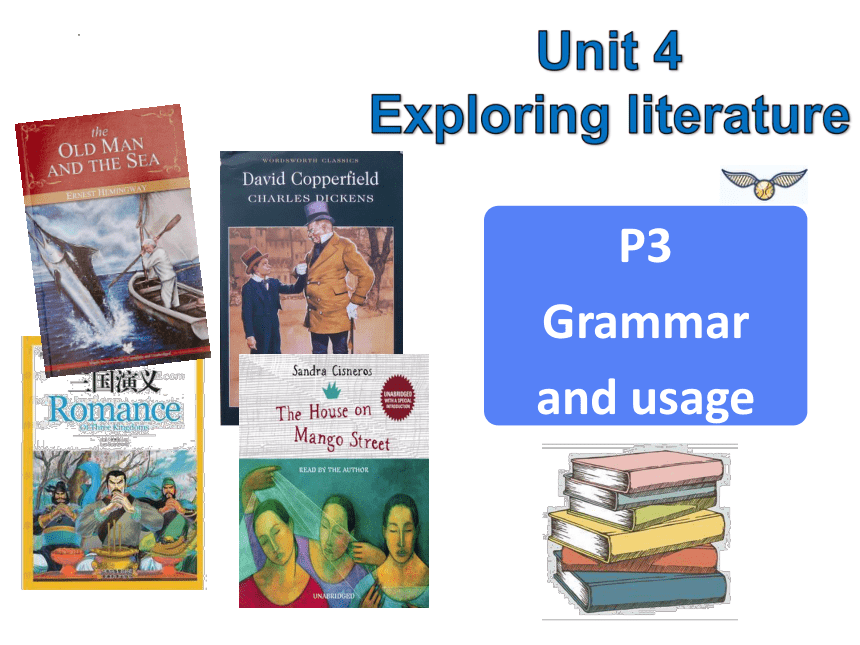
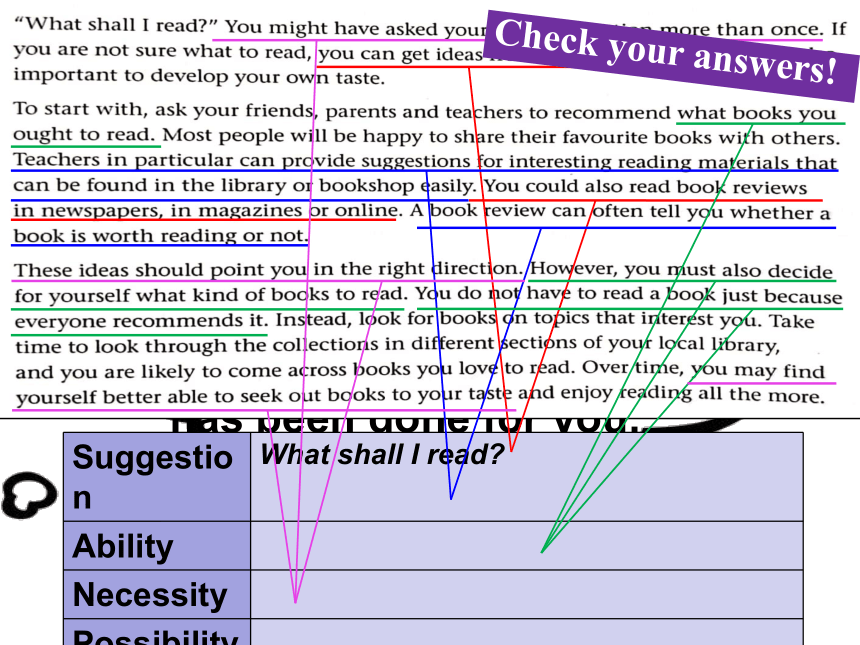
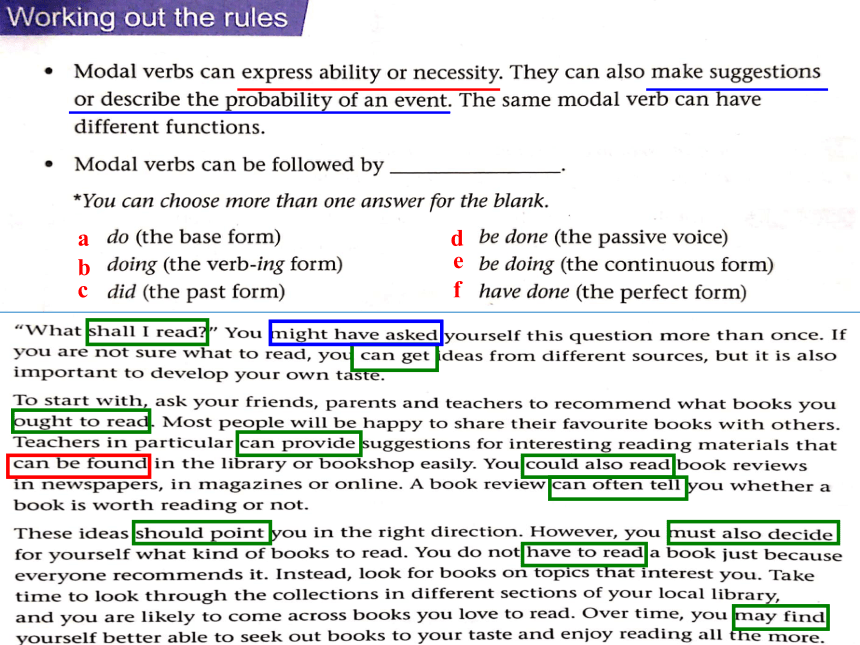
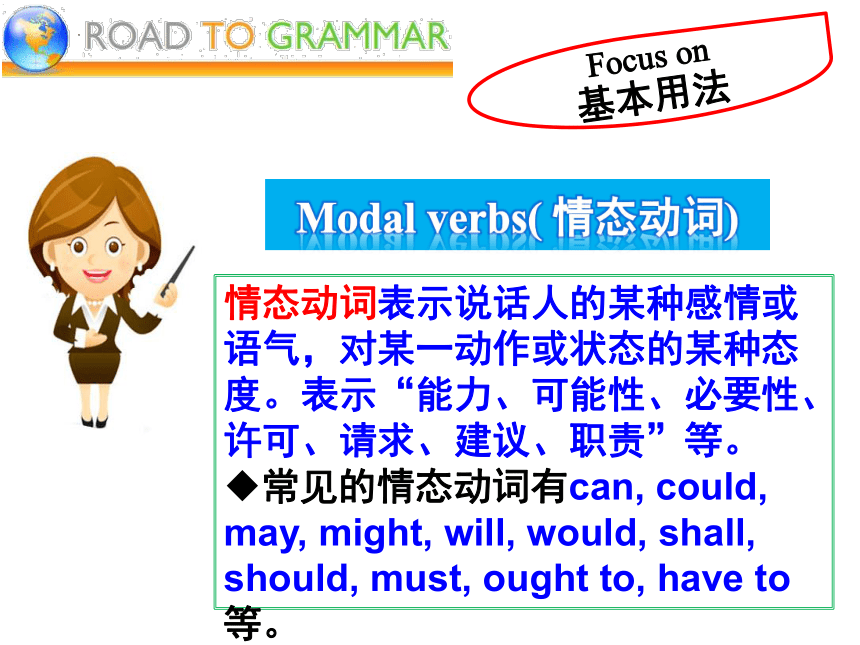
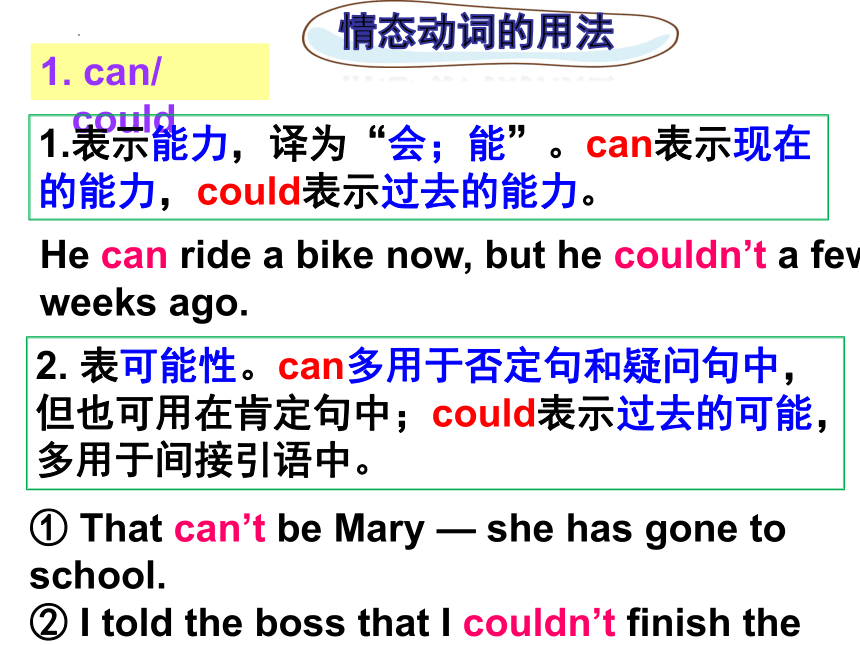
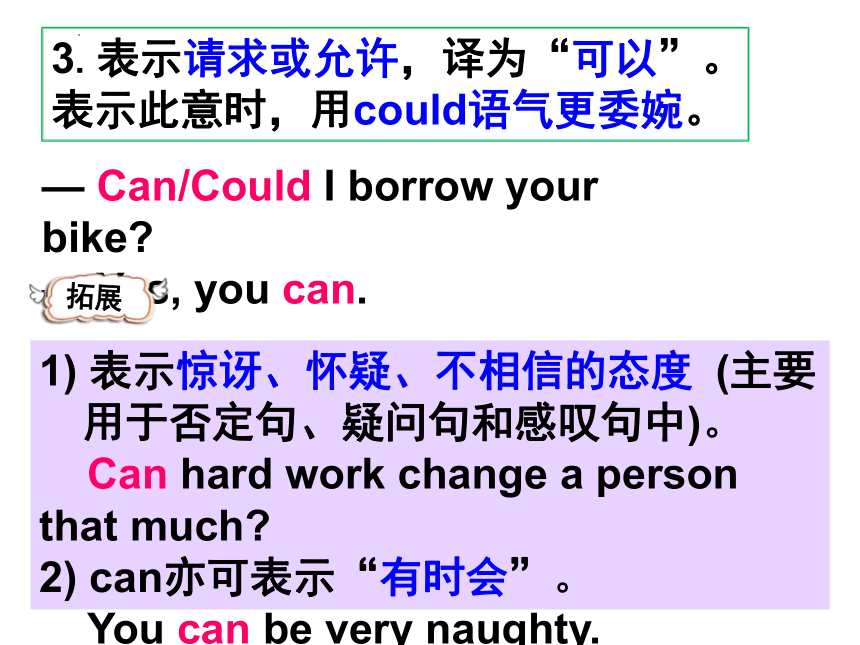
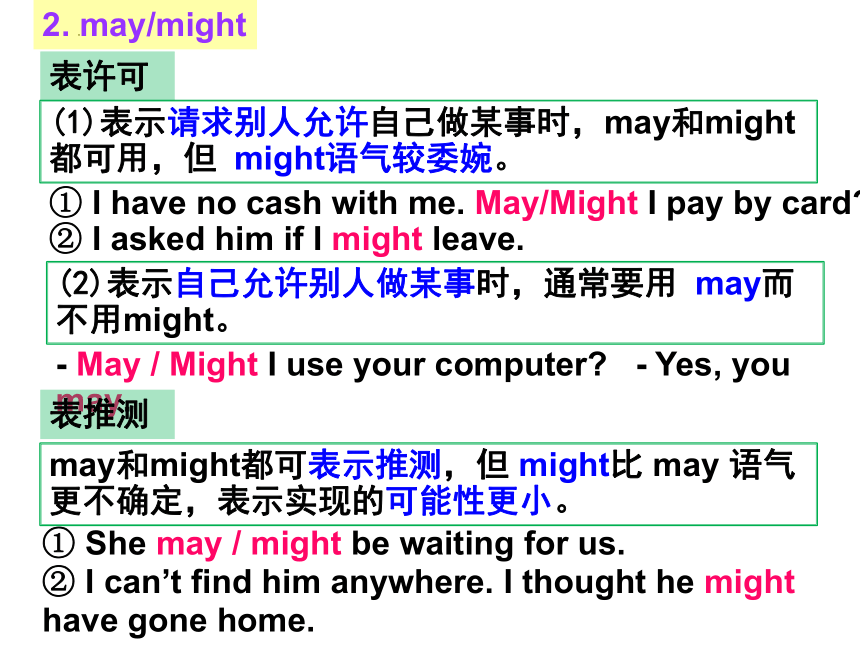
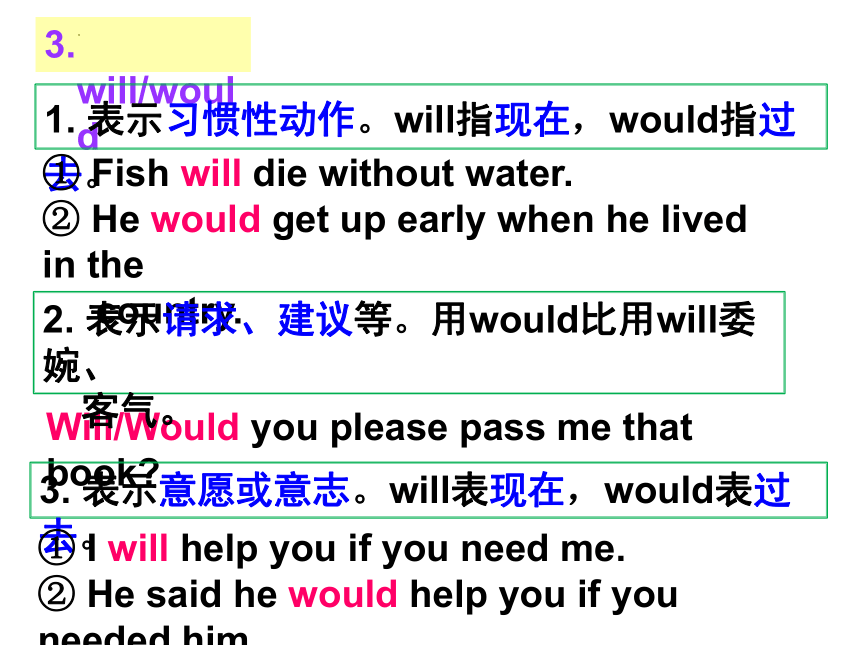
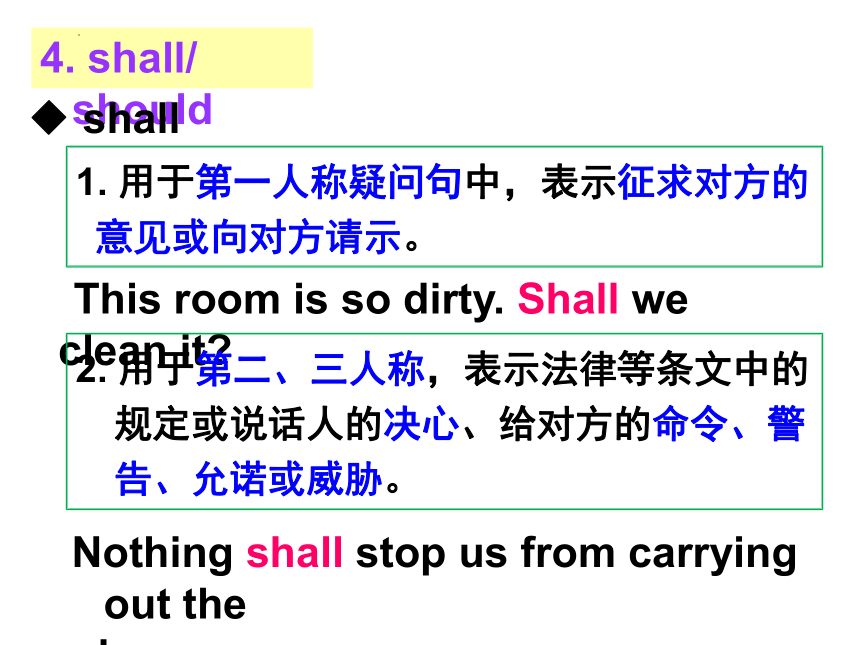
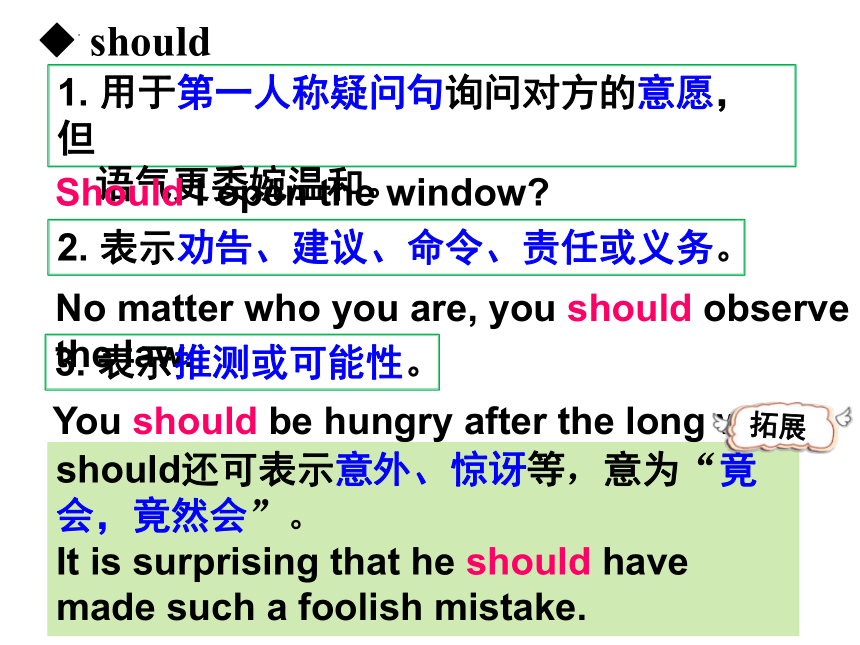
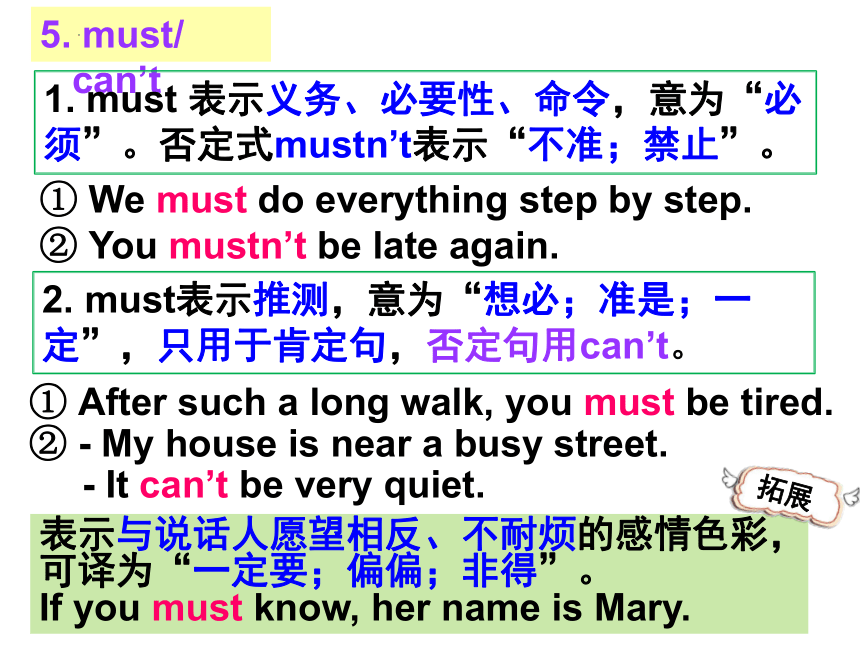
文档简介
(共34张PPT)
N
必修
第二册
Unit 4
Exploring literature
P3
Grammar and usage
Below is a website article about how to choose books. Find the sentences that use modal verbs and fill in the table below. The first one has been done for you.
Suggestion What shall I read
Ability
Necessity
Possibility
Check your answers!
a
b
c
d
e
f
Focus on
基本用法
Modal verbs( 情态动词)
情态动词表示说话人的某种感情或语气,对某一动作或状态的某种态度。表示“能力、可能性、必要性、许可、请求、建议、职责”等。
常见的情态动词有can, could, may, might, will, would, shall, should, must, ought to, have to等。
2. 表可能性。can多用于否定句和疑问句中,但也可用在肯定句中;could表示过去的可能,多用于间接引语中。
1. can/ could
1.表示能力,译为“会;能”。can表示现在的能力,could表示过去的能力。
He can ride a bike now, but he couldn’t a few
weeks ago.
① That can’t be Mary — she has gone to school.
② I told the boss that I couldn’t finish the work in such a short time.
情态动词的用法
1) 表示惊讶、怀疑、不相信的态度 (主要
用于否定句、疑问句和感叹句中)。
Can hard work change a person that much
2) can亦可表示“有时会”。
You can be very naughty.
3.表示请求或允许,译为“可以”。
表示此意时,用could语气更委婉。
— Can/Could I borrow your bike
— Yes, you can.
拓展
① She may / might be waiting for us.
② I can’t find him anywhere. I thought he might have gone home.
2. may/might
(1)表示请求别人允许自己做某事时,may和might都可用,但 might语气较委婉。
① I have no cash with me. May/Might I pay by card
② I asked him if I might leave.
(2)表示自己允许别人做某事时,通常要用 may而不用might。
may和might都可表示推测,但 might比 may 语气更不确定,表示实现的可能性更小。
- May / Might I use your computer - Yes, you may.
表许可
表推测
Will/Would you please pass me that book
3. will/would
3. 表示意愿或意志。will表现在,would表过去。
1. 表示习惯性动作。will指现在,would指过去。
① Fish will die without water.
② He would get up early when he lived in the
country.
2. 表示请求、建议等。用would比用will委婉、
客气。
① I will help you if you need me.
② He said he would help you if you needed him.
4. shall/ should
This room is so dirty. Shall we clean it
1. 用于第一人称疑问句中,表示征求对方的
意见或向对方请示。
◆ shall
2. 用于第二、三人称,表示法律等条文中的
规定或说话人的决心、给对方的命令、警
告、允诺或威胁。
Nothing shall stop us from carrying out the
plan.
No matter who you are, you should observe the law.
should还可表示意外、惊讶等,意为“竟会,竟然会”。
It is surprising that he should have made such a foolish mistake.
◆ should
1. 用于第一人称疑问句询问对方的意愿,但
语气更委婉温和。
2. 表示劝告、建议、命令、责任或义务。
3. 表示推测或可能性。
You should be hungry after the long walk.
Should I open the window
拓展
① After such a long walk, you must be tired.
② - My house is near a busy street.
- It can’t be very quiet.
5. must/ can’t
1. must 表示义务、必要性、命令,意为“必须”。否定式mustn’t表示“不准;禁止”。
2. must表示推测,意为“想必;准是;一定”,只用于肯定句,否定句用can’t。
① We must do everything step by step.
② You mustn’t be late again.
表示与说话人愿望相反、不耐烦的感彩,可译为“一定要;偏偏;非得”。
If you must know, her name is Mary.
拓展
We ought to make a careful plan before we start the work.
① They ought to apologize.
② You are his brother so you ought to take care of him.
1. ought to: 应当;应该 ,意思接近于should,但ought to语气更强。
2. 表示建议或劝告。
3. 表示推测。
Henry ought to be there by now. He left home at six.
6. ought to/ ought not to
【拓展】
ought to have done对已发生的情况表示“责备或不满”,表示“本应该做某事”。
You ought to have told him not to go alone.
◆ 否定式为oughtn’t to或ought not to。
His doctor said to him that he oughtn’t to
smoke so much.
◆ 疑问式是将ought提前。
Ought I to hand in the homework today
◆ 反意疑问句的疑问部分用should或ought
均可。
We ought to go by plane, shouldn’t / oughtn’t we
have to表示 “不得不;必须”,有人称、数和时态的变化。在口语中可用have got to代替have to。否定形式是don't have to,相当于needn't。疑问式为Do/Does/Did +主语+ have to…
① It’s dark now. I have to go home.
② I have to leave because of the bad weather.
③You don’t have to/needn't go if you don't want to.
④Do you have to wear uniforms at school
7. have to / don’t have to
【拓展】
must与have to的区别
两者都表示“必须”,但must常表示说话人的主观看法,而have to一般强调客观需要。have to有人称、数和时态的变化,而must 则没有。
1) You must take good care of her.
2) I have lost my pen, so I have to buy one.
3) Did she have to pay a fine
① You mustn’t tell him about it. It’s a secret.
② You needn’t tell him about it. He has known it.
mustn’t 表示“禁止;不准”;
needn’t 表示“不必;不需要”。
【拓展】用must提问时的否定回答用
needn’t 或don’t have to。
- Must I finish my homework now
-No, you needn’t / don’t have to.
8. mustn’t / needn’t
情态动词的进行式、完成式和被动式
1. 情态动词可以与主动词的进行式合用,表示某动作正在进行。
Jack may be reading in the library.
2. 情态动词可以与主动词的完成式合用,表示过去发生的动作。
① Tom must have arrived home by now.
② You can't have seen Henry yesterday because he was in London.
3. 情态动词可以与主动词的被动式合用。
The road may be blocked.
For the following groups of three sentences, tick the sentence which uses the modal verb differently from the other two.
1
P49B1
ability
permission
possibility
permission
necessity
possibility
possibility
suggestion
Below is an entry in a student's reading plete the entry with the correct modal verbs in the brackets.
2
can't
P49B2
must
could
must
can
should
ought to
Possible answer:
1. You must study quietly in the reading room.
2. You must not eat or drink in the library.
3. You can use the computers to find books in our library.
4. You can borrow two books at a time and keep them for as long as two weeks.
In pairs, make rules for your school library using modal verbs. Using the following examples to help you.
3
Examples:
You must not bring food or drinks.
You cannot take the books out of the reading room.
P49B3
1. (2020 天津)Jim says we ______ stay in his house as long as we leave it clean and tidy.
A. must B. can C. need D. should
2.(2019 天津)My wallet was gone.
_________________________________.
(我只可能把它落在了G9公共汽车上。)
3.(2018 北京)In today's information age, the loss of data ____ cause serious problems for a company.
A. need B. should C. can D. must
I could only have left it on the G9 bus
ability
possibility
permission
obligation
suggestion
能力
职责
可能性
许可
建议
necessity
必要性
Functions of Modal verbs
功能 情态动词
表能力
表可能性
表必要性
表职责
表许可
表请求,建议
can (现在), could(过去)
can, could, may, might, must, should, ought to
must, mustn’t, need, needn’t, have to
should, ought to
can, could, may, might, shall
will, would, should, shall (疑问句),ought to, may, might
注: 另附word文档,点此链接
I. 用can, could, may, might, will, would, shall, should, must填空。
1. He is so clever that he ________ answer all
these questions correctly.
2. When my father was young, he ________ run
fast.
3. - ___________________ I have some more bread
- Yes, help yourself.
4. Every time she was in trouble, she _______
go to him for help.
5. We ___________ work hard to gain more
knowledge while we are young.
can
could
May/Might/Can/Could
would
must/should
6. The computer doesn’t work well; something
_______ have gone wrong.
7. - __________ you please give him a message
when you see him
- Yes, I will.
8. It is already 10 o’clock now. They _______be
there.
9. Some birds _______ fly away to the south when
the weather turns cold.
10. When and where we ________ hold the
meeting has not been decided yet.
must
Will/ Would
should
will
shall/will
用can, could, may, might, will, would, shall, should, must填空。
II. 选择填空。
1. Robert is good at languages and_______ (can/must)
speak four languages.
2. The meeting is very important and you ___________
(would/should) attend it on schedule.
3. I managed to find the street, but I____________
(couldn't/mustn't) find her house.
4. When the girl was five years old, she _________
(might/could) skate very well.
5. Every Sunday afternoon, the boy______(will/may) sit
there hour after hour looking at the traffic go by.
can
should
couldn't
could
will
6. In his childhood, Jack__________(would/could) be
nervous when he met strangers.
7. If you earn more than 5,000 yuan per month, you ______(have to/can) pay tax (税).
8. According to the doctor's advice, the medicine
__________(might/must) be taken three times a day.
9. Rose _______(can't/needn't) be in the classroom
now, because I saw her leave school several
minutes ago.
10. You_________(ought to/will) give up smoking. It
does no good to your health.
would
have to
must
can't
ought to
III. 根据所给汉语提示完成下列句子, 每空
一词。
你哥哥不可能已经找到他的车,因为
今天早上他是坐公共汽车来上班的。
Your brother ______ _____ ______ his car, for
he came to work by bus this morning.
2. 约翰,你一定不要玩刀子,你会伤害
自己的。
John, you ________ _____ with the knife,
or you __________ ______ yourself.
can’t
have
found
mustn’t
may/might
play
hurt
3. 那天你在森林里迷路了,一定很害怕吧。
When you got lost in the forest you _____ _____ _____ very frightened.
4. 我没有赶上早班车,他们一定等我等得不耐烦了。
I haven’t caught the early bus. They _____ ______ ______ for me impatiently.
must
have
been
must
be
waiting
Self-evaluation
Can you use the modal verbs correctly
各个击破
1. Summarize the different functions of the following modal verbs: can, must, should, may, might and shall.
2. Write a paragraph on the book you would like to recommend most with at least five sentences, using proper modal verbs.
N
必修
第二册
Unit 4
Exploring literature
P3
Grammar and usage
Below is a website article about how to choose books. Find the sentences that use modal verbs and fill in the table below. The first one has been done for you.
Suggestion What shall I read
Ability
Necessity
Possibility
Check your answers!
a
b
c
d
e
f
Focus on
基本用法
Modal verbs( 情态动词)
情态动词表示说话人的某种感情或语气,对某一动作或状态的某种态度。表示“能力、可能性、必要性、许可、请求、建议、职责”等。
常见的情态动词有can, could, may, might, will, would, shall, should, must, ought to, have to等。
2. 表可能性。can多用于否定句和疑问句中,但也可用在肯定句中;could表示过去的可能,多用于间接引语中。
1. can/ could
1.表示能力,译为“会;能”。can表示现在的能力,could表示过去的能力。
He can ride a bike now, but he couldn’t a few
weeks ago.
① That can’t be Mary — she has gone to school.
② I told the boss that I couldn’t finish the work in such a short time.
情态动词的用法
1) 表示惊讶、怀疑、不相信的态度 (主要
用于否定句、疑问句和感叹句中)。
Can hard work change a person that much
2) can亦可表示“有时会”。
You can be very naughty.
3.表示请求或允许,译为“可以”。
表示此意时,用could语气更委婉。
— Can/Could I borrow your bike
— Yes, you can.
拓展
① She may / might be waiting for us.
② I can’t find him anywhere. I thought he might have gone home.
2. may/might
(1)表示请求别人允许自己做某事时,may和might都可用,但 might语气较委婉。
① I have no cash with me. May/Might I pay by card
② I asked him if I might leave.
(2)表示自己允许别人做某事时,通常要用 may而不用might。
may和might都可表示推测,但 might比 may 语气更不确定,表示实现的可能性更小。
- May / Might I use your computer - Yes, you may.
表许可
表推测
Will/Would you please pass me that book
3. will/would
3. 表示意愿或意志。will表现在,would表过去。
1. 表示习惯性动作。will指现在,would指过去。
① Fish will die without water.
② He would get up early when he lived in the
country.
2. 表示请求、建议等。用would比用will委婉、
客气。
① I will help you if you need me.
② He said he would help you if you needed him.
4. shall/ should
This room is so dirty. Shall we clean it
1. 用于第一人称疑问句中,表示征求对方的
意见或向对方请示。
◆ shall
2. 用于第二、三人称,表示法律等条文中的
规定或说话人的决心、给对方的命令、警
告、允诺或威胁。
Nothing shall stop us from carrying out the
plan.
No matter who you are, you should observe the law.
should还可表示意外、惊讶等,意为“竟会,竟然会”。
It is surprising that he should have made such a foolish mistake.
◆ should
1. 用于第一人称疑问句询问对方的意愿,但
语气更委婉温和。
2. 表示劝告、建议、命令、责任或义务。
3. 表示推测或可能性。
You should be hungry after the long walk.
Should I open the window
拓展
① After such a long walk, you must be tired.
② - My house is near a busy street.
- It can’t be very quiet.
5. must/ can’t
1. must 表示义务、必要性、命令,意为“必须”。否定式mustn’t表示“不准;禁止”。
2. must表示推测,意为“想必;准是;一定”,只用于肯定句,否定句用can’t。
① We must do everything step by step.
② You mustn’t be late again.
表示与说话人愿望相反、不耐烦的感彩,可译为“一定要;偏偏;非得”。
If you must know, her name is Mary.
拓展
We ought to make a careful plan before we start the work.
① They ought to apologize.
② You are his brother so you ought to take care of him.
1. ought to: 应当;应该 ,意思接近于should,但ought to语气更强。
2. 表示建议或劝告。
3. 表示推测。
Henry ought to be there by now. He left home at six.
6. ought to/ ought not to
【拓展】
ought to have done对已发生的情况表示“责备或不满”,表示“本应该做某事”。
You ought to have told him not to go alone.
◆ 否定式为oughtn’t to或ought not to。
His doctor said to him that he oughtn’t to
smoke so much.
◆ 疑问式是将ought提前。
Ought I to hand in the homework today
◆ 反意疑问句的疑问部分用should或ought
均可。
We ought to go by plane, shouldn’t / oughtn’t we
have to表示 “不得不;必须”,有人称、数和时态的变化。在口语中可用have got to代替have to。否定形式是don't have to,相当于needn't。疑问式为Do/Does/Did +主语+ have to…
① It’s dark now. I have to go home.
② I have to leave because of the bad weather.
③You don’t have to/needn't go if you don't want to.
④Do you have to wear uniforms at school
7. have to / don’t have to
【拓展】
must与have to的区别
两者都表示“必须”,但must常表示说话人的主观看法,而have to一般强调客观需要。have to有人称、数和时态的变化,而must 则没有。
1) You must take good care of her.
2) I have lost my pen, so I have to buy one.
3) Did she have to pay a fine
① You mustn’t tell him about it. It’s a secret.
② You needn’t tell him about it. He has known it.
mustn’t 表示“禁止;不准”;
needn’t 表示“不必;不需要”。
【拓展】用must提问时的否定回答用
needn’t 或don’t have to。
- Must I finish my homework now
-No, you needn’t / don’t have to.
8. mustn’t / needn’t
情态动词的进行式、完成式和被动式
1. 情态动词可以与主动词的进行式合用,表示某动作正在进行。
Jack may be reading in the library.
2. 情态动词可以与主动词的完成式合用,表示过去发生的动作。
① Tom must have arrived home by now.
② You can't have seen Henry yesterday because he was in London.
3. 情态动词可以与主动词的被动式合用。
The road may be blocked.
For the following groups of three sentences, tick the sentence which uses the modal verb differently from the other two.
1
P49B1
ability
permission
possibility
permission
necessity
possibility
possibility
suggestion
Below is an entry in a student's reading plete the entry with the correct modal verbs in the brackets.
2
can't
P49B2
must
could
must
can
should
ought to
Possible answer:
1. You must study quietly in the reading room.
2. You must not eat or drink in the library.
3. You can use the computers to find books in our library.
4. You can borrow two books at a time and keep them for as long as two weeks.
In pairs, make rules for your school library using modal verbs. Using the following examples to help you.
3
Examples:
You must not bring food or drinks.
You cannot take the books out of the reading room.
P49B3
1. (2020 天津)Jim says we ______ stay in his house as long as we leave it clean and tidy.
A. must B. can C. need D. should
2.(2019 天津)My wallet was gone.
_________________________________.
(我只可能把它落在了G9公共汽车上。)
3.(2018 北京)In today's information age, the loss of data ____ cause serious problems for a company.
A. need B. should C. can D. must
I could only have left it on the G9 bus
ability
possibility
permission
obligation
suggestion
能力
职责
可能性
许可
建议
necessity
必要性
Functions of Modal verbs
功能 情态动词
表能力
表可能性
表必要性
表职责
表许可
表请求,建议
can (现在), could(过去)
can, could, may, might, must, should, ought to
must, mustn’t, need, needn’t, have to
should, ought to
can, could, may, might, shall
will, would, should, shall (疑问句),ought to, may, might
注: 另附word文档,点此链接
I. 用can, could, may, might, will, would, shall, should, must填空。
1. He is so clever that he ________ answer all
these questions correctly.
2. When my father was young, he ________ run
fast.
3. - ___________________ I have some more bread
- Yes, help yourself.
4. Every time she was in trouble, she _______
go to him for help.
5. We ___________ work hard to gain more
knowledge while we are young.
can
could
May/Might/Can/Could
would
must/should
6. The computer doesn’t work well; something
_______ have gone wrong.
7. - __________ you please give him a message
when you see him
- Yes, I will.
8. It is already 10 o’clock now. They _______be
there.
9. Some birds _______ fly away to the south when
the weather turns cold.
10. When and where we ________ hold the
meeting has not been decided yet.
must
Will/ Would
should
will
shall/will
用can, could, may, might, will, would, shall, should, must填空。
II. 选择填空。
1. Robert is good at languages and_______ (can/must)
speak four languages.
2. The meeting is very important and you ___________
(would/should) attend it on schedule.
3. I managed to find the street, but I____________
(couldn't/mustn't) find her house.
4. When the girl was five years old, she _________
(might/could) skate very well.
5. Every Sunday afternoon, the boy______(will/may) sit
there hour after hour looking at the traffic go by.
can
should
couldn't
could
will
6. In his childhood, Jack__________(would/could) be
nervous when he met strangers.
7. If you earn more than 5,000 yuan per month, you ______(have to/can) pay tax (税).
8. According to the doctor's advice, the medicine
__________(might/must) be taken three times a day.
9. Rose _______(can't/needn't) be in the classroom
now, because I saw her leave school several
minutes ago.
10. You_________(ought to/will) give up smoking. It
does no good to your health.
would
have to
must
can't
ought to
III. 根据所给汉语提示完成下列句子, 每空
一词。
你哥哥不可能已经找到他的车,因为
今天早上他是坐公共汽车来上班的。
Your brother ______ _____ ______ his car, for
he came to work by bus this morning.
2. 约翰,你一定不要玩刀子,你会伤害
自己的。
John, you ________ _____ with the knife,
or you __________ ______ yourself.
can’t
have
found
mustn’t
may/might
play
hurt
3. 那天你在森林里迷路了,一定很害怕吧。
When you got lost in the forest you _____ _____ _____ very frightened.
4. 我没有赶上早班车,他们一定等我等得不耐烦了。
I haven’t caught the early bus. They _____ ______ ______ for me impatiently.
must
have
been
must
be
waiting
Self-evaluation
Can you use the modal verbs correctly
各个击破
1. Summarize the different functions of the following modal verbs: can, must, should, may, might and shall.
2. Write a paragraph on the book you would like to recommend most with at least five sentences, using proper modal verbs.
